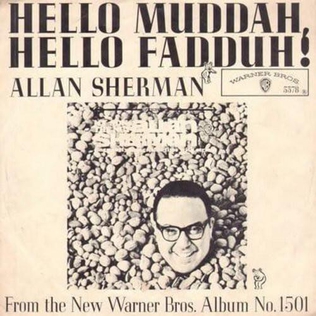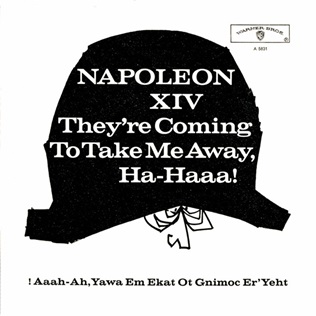A firm is a commercial partnership of two or more people.

Barret Eugene Hansen, known professionally as Dr. Demento, is an American radio broadcaster and record collector specializing in novelty songs, comedy, and strange or unusual recordings dating from the early days of phonograph records to the present. Hansen created the Demento persona in 1970 while working at the Pasadena, California, station KPPC-FM. After he once played "Transfusion" by Nervous Norvus on the radio, DJ "The Obscene" Steven Clean said that Hansen had to be "demented" to play it; this event inspired his stage name. His weekly show went into syndication in 1974 and was syndicated by the Westwood One Radio Network from 1978 to 1992. Broadcast syndication of the show ended on June 6, 2010, but the show continues to be produced weekly in an online version.

A novelty song is a type of song built upon some form of novel concept, such as a gimmick, a piece of humor, or a sample of popular culture. Novelty songs partially overlap with comedy songs, which are more explicitly based on humor, and with musical parody, especially when the novel gimmick is another popular song. Novelty songs achieved great popularity during the 1920s and 1930s. They had a resurgence of interest in the 1950s and 1960s. The term arose in Tin Pan Alley to describe one of the major divisions of popular music; the other two divisions were ballads and dance music. Humorous songs, or those containing humorous elements, are not necessarily novelty songs.
Barnes & Barnes were an American musical duo, formed in Los Angeles in 1970. Most commonly associated with novelty music and comedy rock, their music also incorporated elements of new wave, synth-pop, and folk rock.

Minder is a British comedy-drama series about the London criminal underworld. Initially produced by Verity Lambert, it was made by Euston Films, a subsidiary of Thames Television, and shown on ITV for ten series between 29 October 1979 and 10 March 1994.

The Easybeats were an Australian rock band which formed in Sydney in late 1964. They are best known for their 1966 hit single "Friday on My Mind", which is regarded as the first Australian rock song to achieve international success; Rolling Stone described it as "the first international victory for Oz rock". One of the most popular and successful bands in the country, they were one of the few Australian bands of their time to foreground their original material; their first album Easy (1965) was one of the earliest Australian rock albums featuring all original songs.

Steve Gibbons is an English singer-songwriter, guitarist and bandleader. His music career spans more than 50 years.

Right Said Fred are an English pop band formed by brothers Fred and Richard Fairbrass in 1989. They are best known for the hit 1991 song "I'm Too Sexy".

"Hello Muddah, Hello Fadduh! " is a novelty song recorded by Allan Sherman released in 1963. The melody is taken from the ballet Dance of the Hours from the opera La Gioconda by Amilcare Ponchielli, while the lyrics were written by Sherman and Lou Busch.

"The Homecoming Queen's Got a Gun" is a song by American singer–comedian Julie Brown. It appeared as the B-side to her 1983 single "I Like 'em Big and Stupid". Brown's satire of valley girl culture also parodies 1950s-1960s "teen tragedy" songs.
"Deteriorata" is a comedy record released as a single in 1972. It is a parody of Les Crane's 1971 spoken word recording of "Desiderata", the early 20th-century poem by Max Ehrmann.

Robert George Pickett, better known as Bobby "Boris" Pickett, was an American singer-songwriter and comedian. He is best known for co-writing and performing the 1962 smash hit novelty song "Monster Mash".

"They're Coming to Take Me Away, Ha-Haaa!" is a 1966 novelty record written and performed by Jerry Samuels, and released on Warner Bros. Records. The song became an instant success in the United States, peaking at No. 3 on the Billboard Hot 100 popular music singles chart on August 13, No. 1 on the Cash Box Top 100 Pop Singles charts, No. 2 in Canada, and No. 4 on the UK Singles Chart.

"Star Trekkin'" is a song by British novelty band The Firm. It parodies the original Star Trek TV series and prominently features comical voice caricatures of the Trek characters, provided by members of the band, a studio technician, and the wife of one of the songwriters. One of the song's phrases, "It's life, Jim, but not as we know it", actually originated with "Star Trekkin'" but has been subsequently misattributed to the TV series.

"I Want a Hippopotamus for Christmas" is a Christmas novelty song written by John Rox (1902–1957) and performed by 10-year-old Gayla Peevey in 1953. The song peaked at number 24 on Billboard magazine's pop chart in December 1953.

"Does Your Chewing Gum Lose Its Flavour " is a novelty song by Lonnie Donegan. Released as a single in 1959, it entered the UK Singles Chart on 6 February 1959 and peaked at number three. It was also Donegan's greatest chart success in the United States, reaching number five on the Billboard Hot 100 chart in 1961.
"The Eggplant That Ate Chicago" is a song about alien invasion by Dr. West's Medicine Show and Junk Band. Its author, Norman Greenbaum, later wrote and performed "Spirit in the Sky" to greater chart success. It was re released on Dr. Demento Presents: The Greatest Novelty Records of All Time, Volume III: The 1960s in 1985.
"Feelin' Alright?", also known as "Feeling Alright", is a song written by Dave Mason of the English rock band Traffic for their eponymous 1968 album Traffic. It was also released as a single, and failed to chart in both the UK and the US, but it did reach a bubbling under position of #123 on the Billboard Hot 100. Joe Cocker performed a more popular rendition of the song that did chart in the U.S. Both Traffic's and Cocker's versions appear in the 2012 movie Flight. The song was also featured in the 2000 film Duets, sung by Huey Lewis.
John O'Connor is a British guitarist, songwriter, and composer. He lives in Santa Barbara, California.
"My Baby Left Me" is a rhythm and blues song written by blues singer Arthur Crudup.












